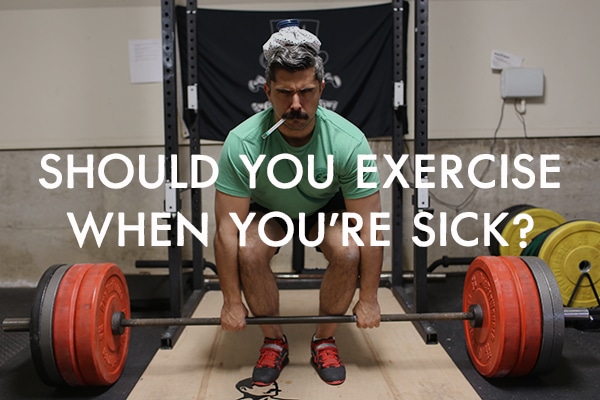
You wake up one morning, and you don’t feel very well. Maybe your sinuses are stuffed up, or perhaps you’ve got a little diarrhea.
You’ve scheduled some barbell training or a run for later that day, but you’re thinking about bagging the workout so you can just focus on recovering.
Is that the right call? Should you skip an exercise session when you’re feeling sick?
This is a question that I put to my online strength training coach, Matt Reynolds, owner of Barbell Logic Online Coaching, a few weeks ago when I was a bit under the weather.
Short answer: no, you probably don’t need to skip your workout.
Nuanced answer: read on.
When You Should Definitely NOT Train
According to Matt, the only times you should skip a workout due to sickness is if you’re running a fever above 99.5 degrees Fahrenheit or you’re regularly vomiting or having diarrhea.
Matt’s prescription is backed by medical professionals. According to sports medicine doctor Lewis G. Maharam, exercising with a fever can cause your already high internal body temperature to increase, which will only make you feel sicker.
Isolated bouts of vomiting or diarrhea by themselves typically aren’t reasons for skipping a workout, but if you’re doing it on the regular, then from a practical perspective you need to skip; as Matt put it, “You don’t want to sh*t your pants or vomit on the floor while you’re working out.” You’d also be putting yourself at risk for dehydration.
Another guideline out there about training while sick is the “neck rule.” If all your symptoms are above the neck (runny nose, headache, sneezing, etc.) go ahead and train. If your symptoms are below the neck (chest cold, body ache, fever), then skip.
If You Have to Ask “Should I Train Today?” You Should Train
Barring a fever or ongoing vomiting/diarrhea, you should exercise even if you feel under the weather. As Matt told me, “If you have to ask the question, ‘Should I train today?’ then you should train. If you’re sick enough not to exercise, you’ll know it.”
So if you have a sinus infection, low-grade fever, bad allergies, the sniffles, headache, already-concluded vomiting or diarrhea, or just feel under the weather, go ahead and train.
The reason you work out even when you’re feeling a little sick is simply for the sake of maintaining consistency in your fitness program. “The goal of weight training while sick isn’t to get stronger,” Matt told me. “We’re trying to avoid going backward with our progress. We’re avoiding de-training. My clients that have had the most success are the ones who consistently work out, even when they haven’t been 100%. Consistency is key to getting stronger.”
The days you have to work out when you’re sick, Matt calls “Blue-Collar Training Days.” Just like a blue-collar job, the workout that day will be hard, and you’re probably not going to look forward to it, but just like a blue-collar job, you put on your proverbial hardhat, roll up your sleeves, and get to work.
Adjusting Your Training While You’re Sick
While you should train even if you’re sick, Matt recommends changing your workout a bit, so you don’t tax your body too much.
“Keep the intensity [weight you’re lifting] up, but decrease volume,” he says. You can maintain intensity and drop volume in a few different ways. For our example, let’s say you’re doing a barbell training program like Starting Strength. One way to maintain intensity while dropping volume would be to lift the same weight you would normally, but do a rep scheme like 2×5 or 3×3 instead of doing 3×5.
Another way to maintain intensity and drop volume would be to keep the same weight and rep scheme on your main barbell lifts, but cut out the accessory work like chin-ups and dips.
Besides reducing volume on days you’re sick, Matt also recommends dropping any HIIT cardio sessions you might be doing after a training session. “HIIT just elevates your internal body temp, and that’s not good when you’re feeling sick. Just do the main lifts, and get back to eating and sleeping well for recovery,” Matt advises.
For runners, maintain the same speed [intensity] you usually run, but cut back on the distance [volume].
My Experience Training While Sick
Since beginning to work with Matt back in 2015, I’ve been hit a few times with sickness. The only time he’s had me bag a workout, however, was when I had a fever or was chronically vomiting. The other times, he still had me hit the weights, even if I felt like crap.
For example, a few weeks ago I got sidelined with the stomach flu and spent an entire night vomiting. I was scheduled to train the next day. I emailed Matt and asked if I should skip. He replied, “If you’re not throwing up now, then go ahead and train. Make sure you get in plenty of water before the session.” He had me lower the volume, but maintain the weight I was scheduled to lift. That session sucked, but I got it done.
You may even surprise yourself with how well you perform in the gym, despite being under the weather. A few months ago, I woke up with a sinus infection — congestion, headache, and a general crappy feeling. I figured I’d have a terrible session, but I managed to hit a rep PR on my deadlift of 410×5. I wouldn’t have been able to do that if I had bagged the workout.
So the next time you’re feeling under the weather and asking yourself if you should train that day, now you know the answer is probably yes.
Get after it.


